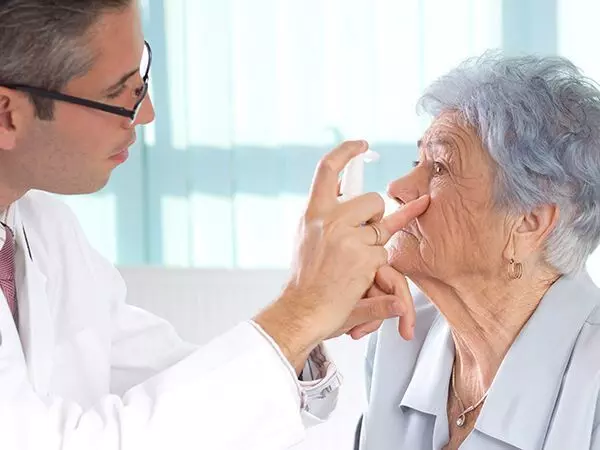Balanced diet to UV protection: Here are some steps to keep eyes safe in old age
An estimated 25% of visually impaired individuals worldwide reside within India and this percentage is said to surge further.
By Sulogna Mehta
Mumbai: Vision impairment and blindness are intricately linked to the aging process and the emergence of late-life disabilities. But vision loss need not be an inevitable part of aging if regular check-ups and a healthy lifestyle are followed.
An estimated 25% of visually impaired individuals worldwide reside within India and this percentage is said to surge further.
Common eye ailments of the elderly
According to medical experts, the elderly encounters a spectrum of challenges, with Dry Eye, Cataract, Glaucoma, age-related Macular Degeneration, Diabetic Retinopathy, Hypertensive Retinopathy, and eyelid conditions like Ptosis or Drooping Eye, Entropion, and Ectropion being common concerns. Notably, cataracts pose a prevailing threat among seniors, obscuring the eye’s innate lens and causing visual blurriness, heightened light sensitivity, and struggles with nocturnal vision. However, modern medical breakthroughs in the form of surgical extraction, followed by the implantation of artificial lenses have effectively brought back clear sight.
Technology can empower visually impaired seniors
Rather than succumbing to these adversities, seniors can proactively safeguard their ocular well-being by embracing progressive eye care strategies, capitalizing on cutting-edge medical interventions, and demonstrating dedication to nurturing their eye health. In the modern era, technology also greatly empowers visually impaired seniors, enhancing autonomy and engagement. Augmented reality, virtual reality, and low vision aids offer renewed opportunities for improved sight and self-sufficiency.
Regular eye check-ups for early detection are vital
Experts point out that it is vital to adopt a proactive approach to eye health. They emphasize the need for annual eye examinations after 40, or more frequent checks for those with diabetes or hypertension.
Early detection is vital, as many eye conditions progress silently. “Prioritizing our eye health is more than ensuring clear vision. It is about nurturing the windows to our world and sustaining independent living. Regular eye check-ups, an antioxidant-rich diet, and an active lifestyle all contribute to maintaining our vision. Remember, prevention is our ally. Early detection can avert irreversible damage,” said Dr Sneha Kankaria, Glaucoma and Cataract consultant from Dr Agarwal’s Eye Hospital, Chembur, Mumbai.
Tips for senior citizens to maintain their eye health
Regular Eye Exams: Schedule regular comprehensive eye exams with an eye specialist, preferably annually or as recommended by your doctor. Early detection and treatment of eye conditions can prevent or slow down their progression.
Balanced Diet: Consume a diet rich in fruits, vegetables, and foods containing Omega-3 fatty acids. Foods like leafy greens, fish, citrus fruits, and nuts can support overall eye health.
Hydration: Ensure proper hydration by drinking enough water. Adequate hydration supports tear production and prevents dry eyes.
Quit Smoking: If you smoke, quitting can significantly reduce the risk of developing eye diseases like macular degeneration and cataracts.
UV Protection: Shield your eyes from harmful ultraviolet radiation by wearing sunglasses that block 100% of UV rays. This practice helps prevent cataracts and other UV-related eye issues.
Manage Chronic Conditions: Keep chronic conditions like diabetes and hypertension under control, as they can affect eye health. Adhere to your doctor’s recommendations and take prescribed medications as directed.
Manage Blood Sugar Levels: For individuals with diabetes, maintaining stable blood sugar levels can help prevent diabetic retinopathy, a potentially sight-threatening condition.
Eye Safety: Guard your eyes against potential hazards by wearing safety glasses during activities that could cause eye injury.
Rest Breaks: If engaging in extended periods of reading or using digital devices, follow the 20-20-20 rule: take a 20-second break every 20 minutes, looking at something 20 feet away to reduce eye strain.
Proper Lighting: Ensure sufficient lighting when reading, working, or performing tasks requiring focus. Inadequate lighting can strain your eyes.
Eye Exercises: Incorporate simple eye exercises, such as focusing on a near object and then a distant one, to maintain eye flexibility and alleviate eye strain.
Maintain a Healthy Lifestyle: Engage in regular physical activity, maintain a healthy weight, and manage stress. These factors contribute to overall well-being, indirectly impacting eye health.
Use Lubricating Eye Drops: If experiencing dry eyes, consult a doctor regarding the use of preservative-free lubricating eye drops to keep the eyes moist.
Stay Hygienic: Regularly wash your hands, especially before touching your eyes, to prevent eye infections.
Limit Screen Time: Minimize prolonged screen time on TV, laptops, and cell phones and ensure proper screen ergonomics to reduce digital eye strain.